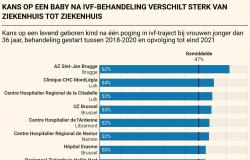In 2023, counts of homeless people were held in Flanders and Wallonia for the fourth year in a row. For the first time, counting took place in cities that had already been covered: Ghent and Leuven. The significant increase in Ghent is particularly striking: from fewer than 2,000 homeless people in 2020 to almost 2,500 in 2023. Remarkable: the number of children in the census even increased by more than 50 percent.
“The strong growth in Ghent is related to the increase in the number of homeless people with psychological or addiction problems. That group increased by more than half,” says Koen Hermans, promoter of the research and affiliated with the Lucas Institute of KU Leuven.
Ghent is not the only place where many homeless people suffer from addiction or psychological problems. “This is partly due to the trend towards increasingly shorter stays in psychiatry,” says Hermans. “That in itself is not a problem, because a long-term stay in an institution is not an ideal solution, but there must be guidance and follow-up afterwards. There is too little.”
Ward Mentens, team coordinator of the mobile team of the Sint-Kamillus care group in Leuven, recognizes this. His team focuses on people who are homeless, with a serious psychiatric condition or addiction problems. “We work with people on average an hour a week. If you come from an institution where you are supervised 24 hours a day, the difference is very big and a large part of the structure you build up is lost.”
Moreover, it is very difficult for anyone who comes out of admission to enter the housing market. “It is very difficult for the social services of a psychiatric department to find them a place to live. They are often people with a limited income,” says Mentens.
Staying on the street can provoke or intensify psychological problems. These people are often difficult to reach. “We call these ‘worrying care avoiders’,” says Mentens. “These are people who need care, but have an anti-psychiatric attitude. They have often gone through an institutional process, and then it takes a long time to build a bond of trust.”
40 percent younger than 25
But psychiatric care also does not sufficiently cater to that target group, says Hermans. In this way, people with a combination of problems collide with the specialization of the care offering. “For addiction care, a psychiatric problem is often a reason for exclusion and vice versa. These people fall through the cracks,” say Alderman for Poverty Reduction Rudy Coddens (Vooruit) and Alderman for Housing Tine Heyse (Groen) of Ghent.
Throughout Flanders, the number of homeless people is estimated at approximately 20,000 people. About forty percent are younger than 25, including almost 6,000 children. “But most minors stay in temporary homes or with friends and family and not on the street,” says Hermans.
Not only people are counted who sleep on the street or stay in emergency shelter, but also people in shelters for the homeless, people who stay in an institution longer than necessary, people in a squat or a caravan, those who stay with family or friends or who are at risk to be evicted within one month.
Tags: Strong increase number homeless Consequence shorter stays psychiatry
-





